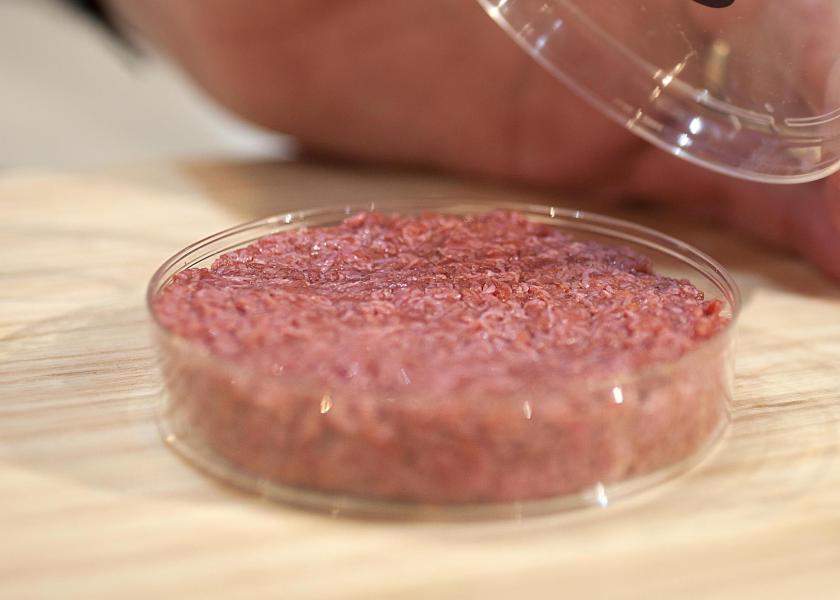Maryland Bill Would Limit What Foods May Be Labeled ‘Meat’

Foods made of animal tissues cultured from cells outside of the original animal, or made from plants or insects could not be labeled “meat” in Maryland under a Republican-backed bill in the Maryland General Assembly.
Senate bill 188 is sponsored by Sen. Jason Gallion, R-Harford and Cecil, who called it “truth in advertising.” Eleven other GOP senators are co-sponsoring the legislation.
“Laboratory-grown meat will become more prevalent in the future, and this bill will proactively prevent these ‘franken-meat’ alternatives from being labeled as meat,” Gallion said at Thursday’s bill hearing.
“We just think it’s unnecessary. Not only are our members in full compliance with all federal regulations on the subject, but we’ve even gone beyond that with our own guidelines,” Dan Colgrove with the Plant Based Foods Association told lawmakers Thursday.
“These products have to be very clearly marked as veggie, vegetarian or plant-based. That’s sort of the point, to offer alternatives to meat products.” Colgrove’s association represents more than 170 companies including Impossible Foods and The Tofurky Co., which make plant-based meat substitutes.
Cell cultured meat can not be purchased from stores yet, according to an email from Cathy Cochran, vice president of Alliance for Meat, Poultry and Seafood Innovation, a lobbying group representing five companies working on bringing cell-grown meat to the market.
In March, the U.S.Food and Drug Administration and Food Safety Inspection Service announced they would oversee the production of food made from cells of livestock and poultry to ensure they are “safely and accurately labeled.”
The meat-labeling bill, if passed, would cost the state an estimated $66,500 in the program’s first year to hire one full-time public health worker who would develop regulations, do outreach and look into who would be affected, according to a state legislative analysis.
The analysis estimated the costs would decrease after the first year.
The Maryland Farm Bureau, a nonprofit that advocates for Maryland farmers and rural families, supports the bill.
Parker Welch with the Maryland Farm Bureau told Capital News Service on Tuesday that the bill would provide customers more transparency.
Welch said the bill would “provide a kind of consumer confidence in the product they’re buying, so when they pick up a package (of meat) at the grocery there’s no confusion in what they’re buying.”
Impossible Foods labels their products “plant-based meat,” and last year they worked with Burger King to introduce the Impossible Whopper, a burger that contains no beef, according to an Impossible Foods press release.
In an emailed statement, Impossible Foods told Capital News Service that the company, “stands for truth and transparency. That’s why our products are clearly labeled plant-based meat.”
In December, a federal court blocked Arkansas from enforcing a law that made it illegal for companies to use words like “burger” or “sausage” for non-meat products like veggie burgers, according to an American Civil Liberties Union press release.
The ACLU challenged the law on behalf of The Tofurky Co., which makes “plant-based burgers” and other meatless foods.
The Maryland bill is different from the Arkansas law in that it would not prevent companies from calling their products “burgers;” it only deals with what can be labeled “meat.”
In Thursday’s bill hearing, chair of the Senate Finance Committee, Sen. Delores Kelley, D-Baltimore County, asked Gallion what the harm is in labeling cell-grown meat, meat.
Gallion explained that this bill acts “preemptively” to protect meat industry farmers, while a milk labeling bill passed last year acted “reactively” in response to plant-based industries “piggybacking” off of the dairy industry’s Got Milk? campaign.
“I think it’s important to have some pro-agriculture bills that come out to support these hardworking farmers who are trying to make a living like everyone else,” Gallion told the committee.
Thirteen states, including Arkansas, have passed similar meat labeling restriction laws, according to a state legislative analysis.
Gov. Larry Hogan, R, signed into law Gallion’s legislation on milk labeling, which prohibits plant-based products, like soy or almond beverages, from being labeled milk — but only if 11 of 14 southern states also pass similar laws. Those states include: Alabama, Arkansas, Florida, Georgia, Kentucky, Louisiana, Mississippi, North Carolina, Oklahoma, South Carolina, Tennessee, Texas, Virginia, and West Virginia.
If that law does go into effect, it tasks Maryland’s Department of Health with developing and implementing milk labeling restrictions.







